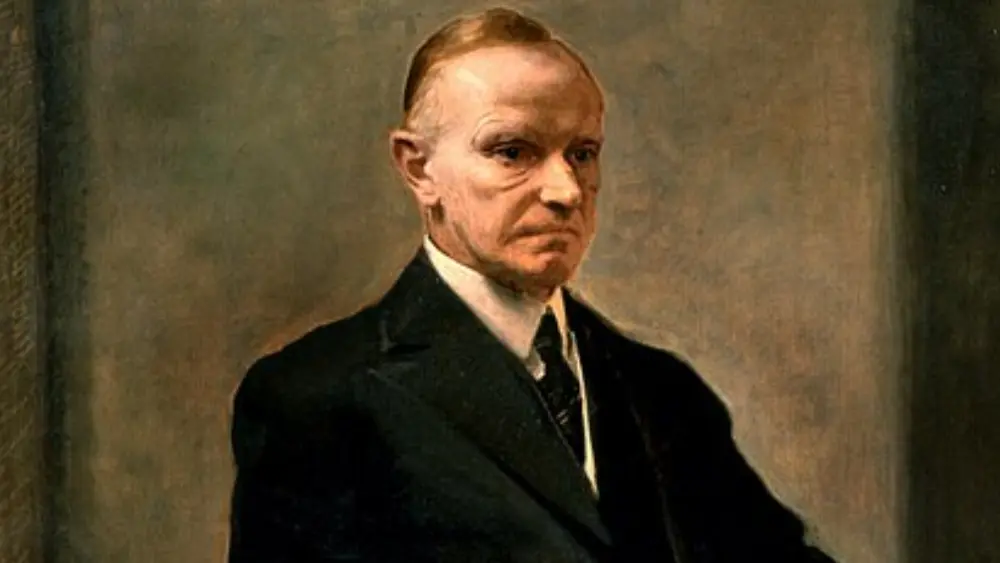Calvin Coolidge, born on July 4, 1872, in Plymouth Notch, Vermont, was the 30th President of the United States, serving from 1923 to 1929. Often known as “Silent Cal,” Coolidge presided over an era of remarkable economic prosperity and stability. His leadership style, characterized by a commitment to limited government and fiscal responsibility, played a pivotal role in shaping the economic landscape of the “Roaring Twenties.”
Early Life and Political Beginnings
Calvin Coolidge’s upbringing in rural Vermont laid the groundwork for his extraordinary political career. Born and raised in a modest environment, he developed a strong work ethic and frugal values from an early age, shaping his character and leadership style. These rural roots profoundly influenced his political philosophy, emphasizing simplicity and fiscal responsibility in governance.
After obtaining a law degree, Coolidge established his legal practice in Northampton, Massachusetts, where he entered politics as a city councilman and later became the city’s mayor. His dedication to constituents and adeptness in local politics garnered attention from higher-ranking Republican Party members. This led to a rapid ascent in his political career, culminating in his election as the Governor of Massachusetts in 1918, marking his transition from local to national politics.
Calvin Coolidge: Governor of Massachusetts
Calvin Coolidge’s role as Governor of Massachusetts from 1919 to 1921 was a crucial chapter in his political career, serving as a platform that showcased his unwavering commitment to fiscal conservatism. During this tenure, Coolidge consistently advocated for and implemented policies aimed at achieving balanced budgets and lower taxes, principles that would go on to define his leadership on the national stage.
Coolidge’s dedication to fiscal responsibility was evident in his unwavering commitment to a balanced budget in Massachusetts, even in tough economic times. He believed that sound financial management was crucial for the state’s well-being, a principle that later defined his presidency. As Governor, he laid the foundation for his reputation as a staunch advocate of limited government intervention and fiscal conservatism. These principles not only guided his actions as Governor but also shaped his transformative leadership as President, earning him the nickname “Silent Cal” due to his quiet but resolute commitment to these values. Calvin Coolidge’s time as Massachusetts Governor marked the start of a political journey that significantly impacted the nation’s fiscal policies and economic philosophy.
Presidential Ascendancy
In 1923, the United States found itself at a critical juncture when President Warren G. Harding’s sudden death thrust Vice President Calvin Coolidge into the highest office of the land. Coolidge’s ascent to the presidency marked a defining moment in American political history, characterized not only by his reserved and unflappable personality, which earned him the enduring moniker “Silent Cal,” but also by the profound influence of his policies on the nation.
Coolidge’s presidency was a testament to the power of steady leadership during turbulent times. His calm and composed demeanor provided a stabilizing force in the aftermath of the tumultuous Harding administration, and it reassured the American people that their government was in capable hands. However, beneath the quiet exterior lay a leader with a clear vision for the country. Coolidge’s policies, rooted in limited government intervention and a commitment to laissez-faire economics, would go on to shape the economic landscape of the Roaring Twenties, setting the stage for a period of unprecedented prosperity and growth. His dedication to fiscal responsibility and reduced government regulation laid the groundwork for an era of economic ascendancy, making Calvin Coolidge a pivotal figure in the annals of American presidential history.
Calvin Coolidge: Economic Prosperity
Calvin Coolidge’s presidency, which unfolded from 1923 to 1929, stands as an emblem of a remarkable epoch of economic prosperity in the United States. During his time in office, the nation bore witness to an extraordinary surge in economic growth and innovation. Coolidge’s administration took deliberate steps to cultivate an environment conducive to business expansion, reduce tax burdens, and curtail government intervention in the economy. The outcome was an era characterized by widespread affluence, typified by escalating wages, heightened industrial production, and a stock market that reached unprecedented heights.
Under Coolidge’s astute leadership, the American economy underwent a profound transformation. The policies he championed not only encouraged entrepreneurship and investment but also nurtured conditions in which businesses could flourish and expand. Consequently, the Coolidge era remains etched in history as a gilded age of economic prosperity, serving as a testament to the potency of prudent fiscal measures and restrained governmental involvement in fostering the growth and prosperity of the nation’s economy. Coolidge’s enduring legacy as a steward of economic abundance continues to inspire, illustrating how a commitment to free-market principles can engender widespread affluence and opportunity for the American people.
The Roaring Twenties
The 1920s, fondly known as the “Roaring Twenties,” represent a pivotal decade in American history, marked by an exuberant blend of cultural dynamism and economic prosperity. Within this vibrant era, Calvin Coolidge’s unwavering dedication to economic conservatism played a substantial role in fueling the remarkable growth and boundless opportunities that defined the period.
The Roaring Twenties witnessed a fervent spirit of optimism and progress, encapsulated by the flourishing of arts, music, and societal change known as the “Jazz Age.” However, it was Coolidge’s commitment to economic principles grounded in limited government intervention and reduced taxation that provided the economic backbone supporting this cultural effervescence. His administration’s policies fostered an environment in which businesses could thrive and expand, leading to significant increases in industrial production, rising wages, and an unprecedented surge in the stock market. Coolidge’s economic conservatism, therefore, stands as a linchpin of the Roaring Twenties, underscoring how responsible fiscal measures can pave the way for enduring periods of growth and opportunity in American history.
Calvin Coolidge: Foreign Policy and Domestic Accomplishments
Calvin Coolidge, often remembered for his reserved demeanor and succinct communication style, left a significant mark on both foreign policy and domestic affairs during his presidency. On the international front, Coolidge’s administration played a pivotal role in shaping global diplomacy through the Kellogg-Briand Pact. This historic agreement, signed in 1928, reflected Coolidge’s commitment to the peaceful resolution of conflicts. By renouncing war as a legitimate means of settling disputes, this pact embodied his vision for a more peaceful world order. Although its effectiveness in preventing conflicts was limited, the Kellogg-Briand Pact served as a symbolic step towards international cooperation and disarmament, setting the stage for later diplomatic efforts.
In addition to his foreign policy endeavors, Coolidge’s domestic accomplishments also stand as a testament to his leadership. The Revenue Act of 1924, signed into law during his tenure, represented a significant milestone in tax policy. This legislation further reduced income tax rates, contributing to economic growth and prosperity in the Roaring Twenties. Coolidge’s commitment to fiscal responsibility and limited government intervention aligned with the prevailing sentiments of his time. These actions solidified his reputation as a staunch advocate for conservative economic principles, leaving a lasting impact on the nation’s financial landscape. In summary, Calvin Coolidge’s presidency left an enduring legacy in both foreign policy and domestic affairs, marked by efforts to promote peace on the global stage and facilitate economic prosperity at home.

Legacy
Calvin Coolidge’s legacy is fundamentally intertwined with his economic stewardship during the vibrant and transformative era of the 1920s. His strong commitment to limited government and fiscal responsibility resonates with small-government advocates and free-market capitalism proponents. Coolidge’s presidency, known for tax rate cuts and limited government intervention, exemplifies how such principles spur economic prosperity and growth. His governance approach was instrumental in fueling the Roaring Twenties, marked by economic growth and cultural dynamism.
Coolidge’s legacy goes beyond economics; he’s remembered as a president embodying his era’s spirit. His ‘Silent Cal’ communication style starkly contrasted the era’s grandiosity, characterized by reserve and brevity. While his presidency may not have been marked by sweeping social reforms or major international conflicts, Coolidge’s legacy endures as a symbol of a conservative approach to government that values limited intervention, individual liberty, and economic freedom. His principles and leadership continue to be a source of inspiration and reference for those who champion these values in modern political discourse.








